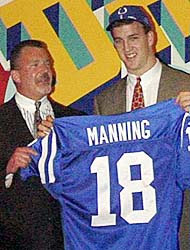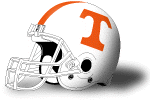

 |
 |
 |
|
SAN FRANCISCO (Oct 19, 1998) -- He made all the plays necessary to win the game. Threw the ball deep, threw it short, threw it exclusively to his own receivers. "He kept them alive," 49ers defensive end Chris Doleman said. "He gave them hope." Doleman wasn't talking about his quarterback, Steve Young. He was talking about the Colts' Peyton Manning. Lost in the celebration of Young -- who passed for 331 yards and two touchdowns and rushed for two touchdowns to deliver San Francisco a 34-31 victory it did not deserve -- was the maturation of Manning. In what was the finest performance of his young career, Manning completed 18-of-30 passes for 231 yards and three touchdowns to Marvin Harrison. For the first time this season, he didn't throw an interception. And he once again demonstrated his acute feel for the rush, absorbing one sack and one intentional grounding penalty while otherwise getting his throws off with no wasted time or effort. His numbers should've been better. For the second game in a row, Harrison couldn't hang onto a deep throw that would've covered at least 45 yards. And Torrance Small let a 21-yard touchdown pass bounce off his fingers. It was anything but the mistake-prone player the 49ers had studied on game films. "I think he was playing more like you'd expect him to play," 49ers linebacker Lee Woodall said. "He was on target, he wasn't making bad decisions. It looked like they were making conservative passes with him, but he definitely was a different quarterback than what we've seen on film." To Manning, it was empty praise. This is a guy who hates to take any days off after a loss, because the only way he can clear his mind is to get back to work. You can only wonder how tough the bye week will be for him to stomach. "Moral victories, even those that exist in this league, really shouldn't," he said. "You try to take something from every game, but this one probably hurt the worst of them all season. The game slipped out from under us. "We came in here to win at all costs. We didn't play to keep it close and get respect." Maybe not. But in the NFL, respect is a commodity not often granted a rookie, particularly a quarterback. "The jump from college to the pros is like going from a tricycle to a car on the highway," Young said. "It's the speed. When I first started playing, I swore there were 30 guys on defense and the field was too small. "The important thing is you have a good frame of mind about it, that you're going to take some hits, physically and mentally. He seems like the kind of guy that has the mental attributes to pull it off." In the short term, it was a painful, emotional, gut-ripping defeat. In the long term, it might've been a significant breakthrough for the franchise, and the franchise quarterback. On a day when a future Hall of Famer was at his best, so was the rookie. In the difference, lies the future. Stat of the week
The NFL typically hires its head coaches from four pools of talent -- offensive coordinators, defensive coordinators, former NFL head coaches, or head coaches hired directly from college programs. Which group fares the best? Believe it or not, it's the former college head coaches (Minnesota's Dennis Green, San Francisco's Steve Mariucci, Jacksonville's Tom Coughlin and Seattle's Dennis Erickson), who are a combined 19-5. The Mind-Eraser
Jets coach Bill Parcells opted to stir the pot in advance of tonight's AFC East game with the Patriots. He criticized his former team, saying running back Curtis Martin's injury problems with New England last year were because of overuse. And now, for the facts that Parcells conveniently ignored. Martin averaged 21 carries per game last year under coach Pete Carroll. In his first four games under Parcells with the Jets, he averaged 26 carries before sitting out a game with an injury. Said Parcells: "I'm not in the preservation business." |